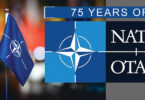Israel is deciding how to respond to an attack by Tehran in which it fired hundreds of drones and missiles. Its allies are urging restraint.
World leaders are urging Israel to act with restraint after Iran launched a large aerial attack over the weekend, firing at least 300 drones and missiles. Israel’s war cabinet has not yet said how it will respond to the first such direct assault launched from Iranian territory after decades of shadow warfare between the two countries.
Here’s a look at what we know about the Iranian attack and its implications:
Why did Iran attack Israel?
Iran and Israel have long engaged in clandestine warfare, attacking each other’s interests on land, sea, air and in cyberspace.
Iran provides support for militant groups that have targeted Israel, including Hezbollah in Lebanon, Hamas in the Palestinian territories and the Houthis in Yemen. Israel has launched a series of attacks including killing Iran’s top nuclear scientist, Mohsen Fakhrizadeh, in 2021, and assassinating an Islamic Revolutionary Guards Corps commander, Col. Sayad Khodayee, in 2022.
The conflict escalated on April 1, when warplanes struck a building in Damascus that is part of the Iranian Embassy complex, according to Iranian and Syrian officials. At least three senior commanders and four officers overseeing Iran’s covert operations in the Middle East were killed. Israel did not publicly claim responsibility for the strikes, but Iran vowed to retaliate.
What happened during the Iranian attack?
Iran’s attack had been expected for days and, in the end, almost all of the missiles and drones were intercepted. An Israeli air base in the Negev desert sustained light damage and a 7-year-old girl was seriously wounded.
Israel used two primary defensive weapons systems, the Iron Dome and the Arrow 3, to thwart the attack. Allies also came to its defense: Defense Secretary Lloyd J. Austin III said that U.S. forces had intercepted missiles and attack drones launched from Iran, Iraq, Syria and Yemen, and Britain and France said their planes had also helped with interceptions. Jordan, which shares a border with Israel, said that its military had shot down missiles and drones that entered its airspace.
What have leaders said about the attack?
Prime Minister Benjamin Netanyahu of Israel on Sunday praised the defensive response, saying in a social media post: “We intercepted. We blocked. Together we will win.”
Leaders of the Group of 7 nations, which include the United States, France, Germany and Britain, issued a joint declaration after a virtual meeting on Sunday that reaffirmed support for Israel and accused Iran of “provoking an uncontrollable regional escalation” that must be avoided.
The United Nations Security Council held an emergency meeting on Sunday where António Guterres, the secretary general, said that it was “time to step back from the brink.” Other leaders including those of Britain and France have also urged restraint.
President Biden, who has used increasingly strong language to criticize Mr. Netanyahu’s war in Gaza, has also repeatedly affirmed the country’s right to defend itself and has sent weapons to the country. But he privately advised Israel against firing back at Iran, U.S. officials said on Sunday.
In a signal that Tehran was not seeking a wider war, Iranian leaders on Sunday said that their retaliation against Israel was over. But they also warned that they could launch a bigger military operation depending on Israel’s response.
What could happen next?
Iran’s attack comes more than six months after a deadly incursion led by Hamas on Israel, which prompted Israel to go to war in Gaza. The Iranian attack has distracted some attention from that conflict, but it also shows the region’s wider volatility, according to Nomi Bar-Yaacov, an expert on Middle East politics at Chatham House, a research group in London.
Israel’s government will be under pressure to respond to the attack, she said. The Israeli defense minister, Yoav Gallant, said on Sunday that its confrontation with Iran was “not over yet.” Even so, it is possible that any Israeli response will not include a large-scale attack on Iranian territory itself, thus limiting the chances of further escalation, according to Ms. Bar-Yaacov.
“Iranians have made it abundantly clear that they consider the attack over,” she said. “I would expect the U.S. to put a terrific amount of pressure on Israel not to respond inside Iran, but rather to attack Iranian assets abroad, meaning its proxies.”
Source: https://www.nytimes.com/2024/04/14/world/middleeast/iran-israel-drones-attack.html
By: Matthew Mpoke Bigg is a correspondent covering international news. He previously worked as a reporter, editor and bureau chief for Reuters and did postings in Nairobi, Abidjan, Atlanta, Jakarta and Accra.







